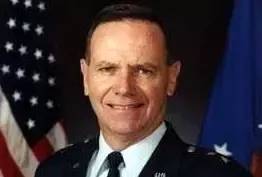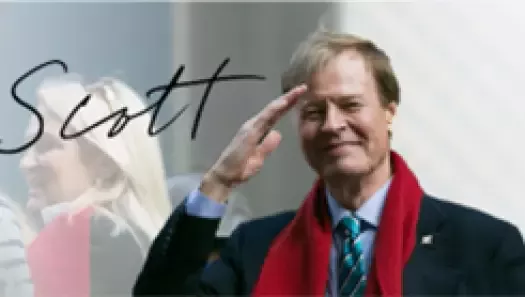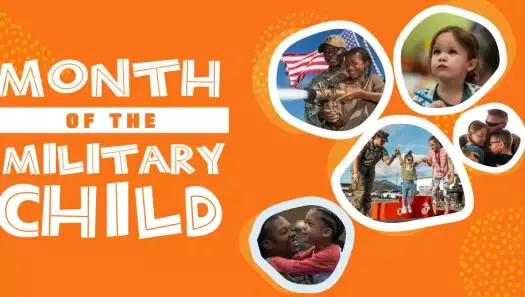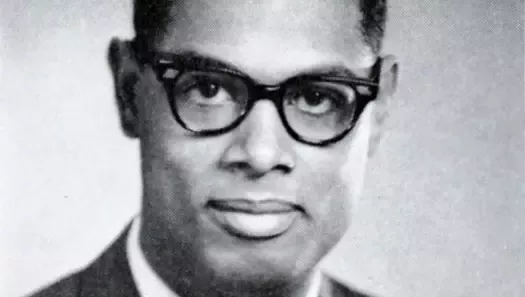WeSalute Awards
HeroVet: Major General Nels Running Shepherd of the Commemoration Of the Korean War

The first time Nels Running actually boarded an aircraft, the Frenchtown, Montana native was traveling from Missoula to Colorado Springs to enter the Air Force Academy.
Although piloting a sleek jet fighter had never been a boyhood ambition, "I got hooked the first chance I had at the controls," he said. This was in 1960.
Fast-forward 3,800 flight hours and 274 combat missions later to the year 2000. Having retired from the Air Force two and a half years previously, Major General Nels Running was selected to coordinate the official commemorations of the 50th anniversary of the Korean War, from its start in 1950 till the armistice three years later that stilled the swords but left the combatants in uneasy limbo. On the cusp of the culmination of his efforts, General Running, while no longer running the show, is pleased at what has been accomplished.
"The war in Korea was not necessarily ‘forgotten,’" he said during a telephone interview from his home in Arlington, Virginia. "It’s more like ‘neglected.’ Because you can’t forget something you never knew. America was busy rebuilding from World War II and this ‘police action’ was more hidden than heralded. There was a mountain of ignorance about what was going on over there.
"Back then television didn’t have the reach it did even ten years later," he said, noting that fewer than ten percent of American homes owned one of the early black-and-white TVs. "Most of the Korean War vets I’ve spoken to believed that no one really cared. For the most part they came home individually. There were no parades. Some felt shunned: some VFW posts refused them membership because they had fought in a ‘police action’ and not a ‘real war.
"Most of those who served came home, hung up their uniform in the attic and got on with their lives. For most Americans, the movie and later black humor of the television show M*A*S*H embodied their war.
"It wasn’t until veterans of Vietnam agitated and forced the country to pay attention with the dedication of the national memorial in Washington that Korean vets said, finally: ‘What about us?’" In Korea, one of the highlights will be the unveiling of a peace monument at the Korean War Memorial in Seoul acknowledging the contributions of the 21 allied nations that sent troops or medical personnel in support of the United Nations effort in Korea. On the 19th of September, ceremonies at Fort Mason in California will mark the repatriation of Korean War prisoners of war.
As a combat veteran, General Running is intimate with loss. Near the end of his first combat tour in Southeast Asia, he recounted, he was mission commander, piloting an F-105 on a bombing run targeting a rail yard northeast of Hanoi. As they closed in on their objective, screaming down at the heavily defended facility, a captain flying on his wing - too close on his wing - "took the bee-bees that missed me. He started to burn. We tried to get him headed out toward the sea. He headed instead northwest into the jungle. He blew up right in front of my face." The scene is grafted in his memory forever, one among many. He can only imagine the scenes of carnage and chaos, of loss and death and suffering that still play in the minds of ground troops.
Because many of his overseas assignments were in Korea, he has a special affinity for its people and for the allied effort that preserved their freedom and laid the foundation for a budding democracy and robust economic power.After his second tour in Vietnam, after flying the F-4E with the Air Force Thunderbirds, after commanding the 26th Tactical Fighter Aggressor Squadron in the Philippines, he was assigned to the 8th Tactical Fighter Wing at Kunsan Air Base in South Korea as director of operations, then vice commander.
"This is all tremendously important for the veterans as individuals because they get a sense that what they did and how they suffered was not in vain, that America recognizes and respects their service and their sacrifices," General Running said.
He has a letter from a Marine sergeant he received on the 17th of April 2000, the day he began his tenure with the committee. "I came home, after having spent that terrible winter in 40-degree-below-zero weather, ill-equipped, uniforms unable to shelter me, freezing to death, the hardships we went through," the sergeant wrote. "I came back and no one cared. And so I went about my business. But I wrote, got your package the other day, and it brought a tear to my eye because I realized that someone cares."
And that, General Running said, "is the core of the mission. To see that each and every one of the 1.8 million veterans or the families of those who are no longer with us recognize that our nation does care, that we do appreciate what they did" at Inchon and Chosin and Seoul. "I hope," the general added, "that they’ll finally get some feeling of closure."
Image Credit: https://en.wikipedia.org/wiki/Nels_Running



